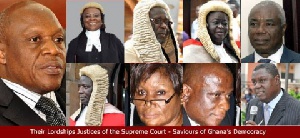The Danquah Institute (DI), a think-tank associated with the opposition New Patriotic Party (NPP), will Today Wednesday Sept 25, dissect the rulings of the nine Supreme Court Judges who sat on the landmark presidential election petition.
The symposium will convene jurists and other legal and statistics experts to critique the judgement of the Supreme Court in the presidential election petition filed in December 2012 by Nana Akufo-Addo and two others.
The Symposium, which is themed: “Reviewing the Supreme Court’s judgement in Akufo-Addo vs John Mahama,” will take place at the National Theatre at 5pm and will feature renowned legal luminaries such as Lawyer Sam Okudzeto, former President of the Ghana Bar Association, Prof. Kwame Frimpong, Founding Dean and Professor of the GIMPA Law School, and currently the Dean at the School of Research and Graduate Studies at the MountCrest University College; Kissi Agyabeng, Senior Law lecturer at the Ghana Law School and Dr Maurice Ampaw, a lawyer and the President of the Legal Advisory Foundation as speakers.
Nana Akufo-Addo, the 2012 flagbearer of the opposition NPP and two others, gathered thousands of documentary evidence to back their case that the December 2012 presidential elections was fraught with irregularities, malpractices and omissions that compromised the election of John Dramani Mahama as president.
They contended that there were over-voting, voting without the use of the mandatory biometric verification machines, duplicate serial numbers of ballot accounting documents (Pink sheets), absence of signature of presiding officers and several unknown polling stations.
But after more than eight months of gruelling legal arguments from the petitioners and the respondents, the nine-member panel of judges, who sat on the case and presided over by Justice William Atuguba, dismissed the case by an average voting pattern of 5 to 4.
The judgement came as a shock to many people, including the petitioners who claimed their case was “air-tight” because they gathered “overwhelming” evidence to nail the Electoral Commission and President Mahama.
Some of the hitherto revered provisions in the Constitutional instrument (CI 74) that guided the elections were basically waived by the Supreme Court’s ruling.
For instance the court’s ruling meant voting without the biometric verification machines cannot have any significant impact on the results of the elections, also the failure of Presiding Officers to endorse the final ballot accounting document does not invalidate the results from the particular polling station.
The former First Lady, Nana Konadu Agyeman Rawlings and the leader of the National Democratic Party (NDP) could not fathom the verdict.
To her, the judgement created the impression that the anomalies including over-voting, voting without verification and unsigned pink sheets of presiding officers did not matter, adding “we are left confused.”
The Symposium
The Petitioners in the election petition said they disagree with the Supreme Court’s decision but will not go for review.
Renowned legal practitioners will do their own review and assessment of this landmark case.
The case is over but its consequences are certainly not. No politics, just law and what it means to our democracy, our judiciary and future elections.
What are the implications of this judgment: Did a majority of the court say over-voting did not matter? What exactly is ballot-stuffing and how is that different from over-voting? Did the Court say it was alright to vote without biometric verification? Did the Court ignore an entrenched constitutional provision? What does it mean for the 2016 and other subsequent presidential elections?
These and many more will be answered today: ” a statement issued by the organizers said.
General News of Wednesday, 25 September 2013
Source: daily guide

















